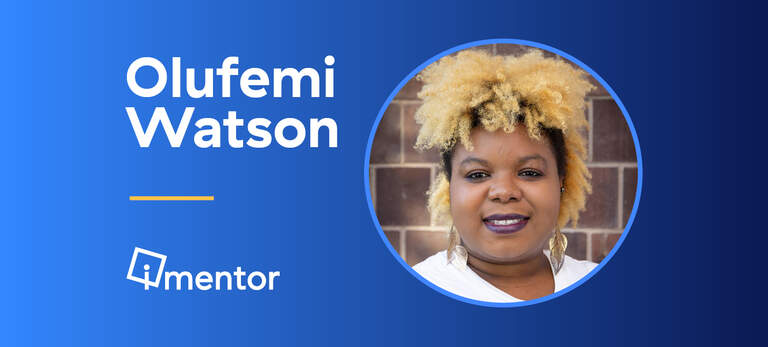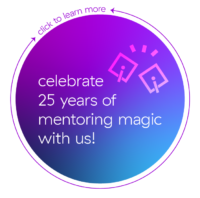iMentor continuously works to amplify Black voices and experiences. For Black History Month, we are highlighting some of the leadership stories of Black staff as they describe what motivates them to invest in iMentor students and pursue education equity work.
Olufemi J. Watson is an Associate Director of Program at iMentor NYC. When we spoke to Olufemi, she shared how her identity as a Black woman influences her work and what moment in her career reaffirmed the importance of representation in the education system.
What first inspired you to get involved in education equity work and build a career in this field?
To start, I never envisioned myself working in education. When I was younger, I thought I would work in medicine, or something related to that path. The first profession to ever come out of my mouth at three or four years old was dentist. After graduating from college, I completed two AmeriCorps years: one with City Year, where I got to work directly in the classroom with students; and the other with Public Allies, where I did a nonprofit apprenticeship. In my time with Public Allies, I was placed at an organization that worked with young people, but my work wasn't directly with students. I missed working with students and I was thinking, “Yeah, I need to get back into the classroom as soon as possible”.
In my year with Public Allies, I learned the different ways I could be involved in education that didn’t follow the traditional route of being a teacher. That experience taught me about principles of program design, which piqued my interest in working at nonprofits. I realized I wanted to resume my work with young people through nonprofits and a year later, in 2016, I found myself at iMentor. It has been an amazing five and a half years of working with the organization. My work supporting students directly as a program manager at iMentor motivated me to pursue my master’s degree in youth studies at the CUNY School of Professional Studies to further my learning and become a better youth development professional.
How does being a Black professional influence your work?
Being a Black professional influences me to show up as my authentic self in every space without feeling like I have to whitewash myself in any way. I've never felt the need to do otherwise in my time at iMentor, which I'm grateful for. In my work with students, I found it important for them to see me as a real person and not a caricature. Black, Latinx, and BIPOC students could see a Black woman who is a professional but who is different from what young people often think adults are like—very serious and devoid of understanding, sympathy or empathy for them or their experiences.
I think the most important thing to remember as a Black person navigating the professional world and the world at large is that blackness is not a monolith and showing up as my authentic self in every space I occupy is enough.
Was there a distinct moment when the importance of representation in the education system was reaffirmed for you?
I think it was reaffirmed for me when I did my first AmeriCorps year with City Year. I am a product of New York City public schools and I went to a predominantly white institution for college. While I was in City Year, I remember conversations with my peers about our views on education and how we grew up. Most of my teammates were from Manhattan, The Bronx or similar neighborhoods in other parts of the country. We had a couple of team members who grew up more privileged and it made me think about the ways in which outsiders may view students who look like me. I thought about the positive impact I could have as someone in the education space working with Black, Latinx, and BIPOC students.
My friends and my experiences were often reflected in those of the students we served. I don't believe any of my teammates had malintent, but I think there are often misunderstandings and preconceived notions about what young people from certain places can accomplish or have experienced. I really saw that when I was in City Year. I also reflected on how few Black teachers I had and educational leaders I saw, especially K to 8, and remembered that when I did, it was an important and formative experience.
From your experience in student-facing work, what are some ways people can better support Black and brown students and help them gain access to more educational resources?
Plainly, it starts with listening to young people. Helping students realize what’s important to them while respecting their autonomy to make decisions should be how we support young people. Anything outside of that illustrates the typical power dynamic of youth and adult relationships, which is what we need to move away from.
So often, adults working with young people don't listen to them, but instead, try to prescribe solutions to perceived problems while not including young people in decision-making about their lives. It is often assumed young people, particularly in communities iMentor and similar organizations serve, have no clue what they want and therefore need to be given a preconceived and usually outdated idea of success. I often take the approach with both my students and mentors that there's no straight and narrow path to success, but you must know what you want and be willing to put in the work, even when they’re unsure of the end goal.
Something I read once and would often share a paraphrased version of with iMentor’s volunteer mentors is: "Teenagers are so misunderstood. They are treated like children and expected to act like adults." Additionally, a former classmate in my master’s program once said: “The youth deserve second, third, fourth chances. They have to make mistakes in order to learn. They deserve to be advocated for and listened to. You cannot be their advocate if you don’t listen to them.”
What advice do you have for students in this program who want to build their leadership skills?
Never shy away from an opportunity where you could learn something. I know there are so many opportunities presented to you and it can feel overwhelming, but setting aside time every day to look for ways to get involved in your community—either at school, your place of worship or the community at large—can go a long way. And reframe your thoughts around what you feel are setbacks and use it as a learning opportunity. Finally, do things off the beaten path. Just because everyone does something one way doesn’t mean it is the only way. Don’t be afraid to create your own path and follow your own vision to success.
Want to learn more? Check out "Why Every Workplace Needs Affinity Groups" and watch this conversation about "Understanding POC Student Experiences at Predominantly White Colleges"

